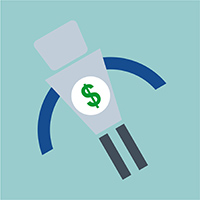Podcast: Play in new window | Download | Embed
Today’s Guest

In this episode you will learn about how artificial intelligence is disrupting marketing.
Chad Pollitt is an expert in Marketing Analytics & Artificial Intelligence.
This is the 96th session of Smart Brand Marketing.
MY BIGGEST TAKEAWAY:
As AI advances it will eliminate a ton of waste in marketing. We no longer will need to decide what content to create and whether it will be well received.
TOPICS DISCUSSED
- AI & Marketing
- One degree vs three degree analytics
- Three types of AI
- Prescriptive attribution
- Content intelligence
- How is AI disrupting marketing?
- What will AI become?
- Demand Supply Platform
- When blockchain meets marketing
AI is Changing the Marketing Game (and Why it Should be Okay for Everybody)
Let’s get this out of the way. Every technological change out there, be it minor or major, has always been met with equal parts excitement and apprehension. The same goes for marketing. When the TV became a thing, the radio marketers got worried. When print technology became the norm, you can be sure that the town criers and heralds would want nothing to do with it.
One of the biggest, if not THE biggest, additions in marketing in recent years is Artificial Intelligence and you’d be right if you think that people are worried about this new development. The question is this: Is AI really going to be that disruptive to well-established marketing strategies? The short answer is yes. As to how exactly it is going to impact a marketer’s strategies? That really depends from one person to another.
The 3 Types of AI
Before anything else, we’d best understand how exactly artificial intelligence functions. It’s easy to say that AI simply connotes every computer program out there. While that may be true to some extent, AI as a concept is actually divided into three levels or categories.
Artificial Narrow Intelligence

This is perhaps the most basic level of AI out there. ANIs are simply programs that were designed for very specific sets of purposes and, as such, have a very limited, or narrow if you will, application. Currently, technology is able to provide generally ANI products which include Google’s self-driving cars, Microsoft’s Cortana program, Amazon’s Alexa, and, of course, Siri.
ANI is basically the infancy stage of Artificial Intelligence and, as such, is currently what most marketers have to deal with. These types of AI are somewhat capable of handling human interactions but never to the point that they can actually replace humans in the equation.
Artificial General Intelligence

This is currently the experimental phase of AI technology. Unlike ANIs, AGI possesses more capabilities than their predecessors in the sense that they can nearly mimic humans in the way we solve our problems. Unlike ANIs which have a very specific set of functions to perform, an AGI is allowed to learn on its own and come up with solutions custom-made for a very specific situation.
Amazon is currently toying with this concept through their Alexa program. The future, they claim that the next iteration of Alexa will not only do what you tell them but will even offer you alternatives based on your past interactions with it and even insist if it believes that the alternative it offers is the superior version of what its owners asked. Students in MIT are also developing AI that can adjust their orientation and pace depending on the terrain and even react to stimuli directed towards their “bodies”.
It’s safe to say marketers have yet to address issues with AGIs as current AGI technology is not fit for marketing purposes. However, marketers of the next decade might have to consider such programs for their campaigns.
Artificial Super Intelligence

Now, we go to straight up sci-fi territory. If ANI is about assisting human intelligence and AGI is to mimic it, ASI is meant to surpass it. Think of HAL 9000 from 2001: A Space Odyssey, think of Skynet from Terminator, think of Ultron from Avengers, and, of course, C-3P0 from Star Wars.
As the name implies, ASI possesses unprecedented self-learning abilities making it similar to the concept of a supercomputer. Simply put, if you challenge this level of AI in a game of chess, not only has it predicted how it will beat you in that round but in the next 10 rounds. And while it is in the process of beating you in chess, it’s also beating 50 other persons simultaneously. It’s scary but this is the face of AI in the future or, at least, the ones experts believe will happen given the current trends in ANI and ASI.
As far as marketing is concerned, ASI is a problem that has yet to present itself by the mere fact that it has yet to be brought into existence.
What Exactly are Marketers Apprehensive About AI?

Simply put, marketers believe that AI is going to disrupt how marketing is done by forcing a mass replacement of human-based factors in the process. If AI can do the work of 50+ people, then that means the human factor is no longer going to be relevant in the marketing process which, in turn, results in an equally robotic result. Simply put, if a potential client is being serviced by an AI program, marketing experts believe that the results will not be as natural as expected.
There is also the fact that AI in its current mass-produced phase, ANI, still has some limitations. For instance, Siri and Alexa can still mishear your commands which leads to them giving the wrong options for their owners to choose from. It also does not help that things like sarcasm, idioms, and languages aside from English are still foreign concept to these programs. If such level of AI were to be given more responsibilities in the marketing process, the data that they will gather might not paint the most accurate picture of a business’s current figures or even current trends in the market.
On the Flip Side…

Yet, there are those that contend that most of the perceived problems people have with AI-based marketing are based purely on misconception and conjecture. Firstly, AI is not there to remove humans out the marketing equation. They are there to assist them in the process. One of the biggest trends in marketing nowadays is the so-called relationship marketing where there is a greater degree of interactivity between the client and the marketer.
The problem with this type of marketing is that for every marketer out there, there are thousands of potential audiences. How is one supposed to give each audience an experience unique to each person if they are just one person interacting with thousands? This is where AI comes in as they give a marketer cues on what that person wants given their past purchases and surfing preferences.
Next, AI is there only to help reduce “waste” in the marketing process. Like it or not, marketing itself is a wasteful process as it deals with finding ways to reach out to people based on current trends and consumer behaviors. More often than not, the assumptions of a marketer are wrong because they misinterpret the data being given to them or the data itself is considered outdated.
With the help of AI, however, such wastes are reduced or completed removed. Programs can help a marketer determine what works best as these programs collect real-time data on what people like and respond to best in the market. This way, any strategy a marketer can come up with is going to be far more effective and, if possible, maximizes whatever resources that they currently have.
Lastly, AI is there to reduce problems brought about by misconception. Sure, speech recognition in AI has still a long way to go but that does not mean that they haven’t improved a lot since 2016. Alexa’s recognition software is currently in its best form to date as well as that of Siri’s, Duer’s, and Echo’s. This results in a far easier collection of data that should be more accurate for marketers to analyze.
The best part about this is that even if speech and text recognition has yet to become a tool for small business marketers, it is certain that the version that they will get their hands on in the next few years will be a far superior version than what big-time marketers currently employ.
What Content Intelligence Addresses
“Data driven” is perhaps one of those overused buzzwords that marketers tend to use to remind people that they are in the know of whatever works in marketing now. But what actually happens is that marketers still just refer to their sales figures, search volumes, and every other conventional data that they can get their hands on; only at a faster pace.
These are all good sources of info but their relevance tends to quickly deteriorate with every passing minute. This is where content intelligence comes into play as it addresses several major issues in marketing.
Reliance on Anecdotal Data

If you really think about it, marketers always rely on what has worked in the past in order to come up with new ideas. It’s always consumer behavior, sales figures, past and recent trends, and every other data that has been recorded, noted, and analyzed. What you end up is just marketers repeating the same patterns over and over without actually breaking into new grounds and lead consumers forward.
Data intelligence aims to improve on this current scheme by focusing more on giving marketers enhanced predictive abilities. The AI simply streamlines all the processes and even automate some decisions for you via a scaling system. These, in turn, should help any marketer utilize the data they have in means that involve more than second-guessing where the market trends will be heading to and even discover new market segments and strategies to tap into.
Content Creation

Putting out content out there is as bold as it is risky. You’d never really know how people would react to the content you made well until the first few hours of it going live. Even the content that you think was well-produced and well-thought of is going to bomb if it comes off as tone-deaf, pandering, and vapid. If you want a perfect example of that, look no further than what happened with Kendall Jenner’s Pepsi ad.
Now, Pepsi would have avoided that fiasco altogether if they let AI programs help their marketing team in the content creation process. This does not really mean that the AI does the content creation for you (not yet, at least) but give you the data you need to create compelling content and even automatically finish some basic processes on your behalf. Coca-Cola, for instance, has been using AI that creates scripts and story lines for their TV ads, telling them which music to use and even creating ideas for certain scenes.
It’s not only creation that AI can be effective at but also promotion. Certain AI programs now can tell marketers what content to promote, how to promote it, and when to promote it. This should result in a highly effective network of cross-promotion through different channels that should not have been possible if we are only to rely on truly human means.
Keeping Content Evergreen

Supposed that your content team created a piece of content that funneled in a lot of traffic to your site, got shared the most on Twitter and Facebook, or was viewed a lot on YouTube. Do you just immediately chuck this content to the archives after a few weeks? No. The more sensible thing to do would be to revisit the thing after a few months and find ways to update it or include it in your current marketing strategies.
This is where AI can become effective as some programs out there are designed to help you not only archive your content but also mark the most engaging content for you. Admittedly, finding out which of your past content has performed well can be difficult if your archive is that big. With AI, however, these content can be brought back to the forefront automatically, giving your marketers a chance to reuse your content and reintroduce them to the public.
The Future?
So, we’ve basically established that AI is disrupting the marketing game right now. It’s up to you to decide whether those disruptions are to your disadvantage or not. However, the question is: is it done disrupting the way marketing is done now?
It’s safe to say that AI’s impact in marketing is far from done. Actually, it’s just starting to change the way marketing is going to be done in the immediate and distant future. Who knows, there might be marketing teams in the future comprised mainly of AI programs doing more work than what any human person can do and achieving results at a faster rate. It’s not exactly a matter of if it will happen but when.
Are you excited for the way AI is shaping marketing right now? What other ways can you think that AI will assist marketers in the future? Let us know in the comments below!
References:
https://www.techemergence.com/artificial-intelligence-in-marketing-and-advertising-5-examples-of-real-traction/
https://www.curata.com/blog/content-intelligence-infographic/
https://www.curata.com/blog/content-intelligence/
RESOURCES
CHAD IN ACTION
THANK YOU FOR LISTENING!
To get more SBM content sent directly to your device as they become available, you can subscribe on iTunes or Stitcher!
Also, reviews on iTunes are extremely helpful and greatly appreciated! I read each and every one of them, and feel free to share your URL there so I can contact you later on and say thanks!


